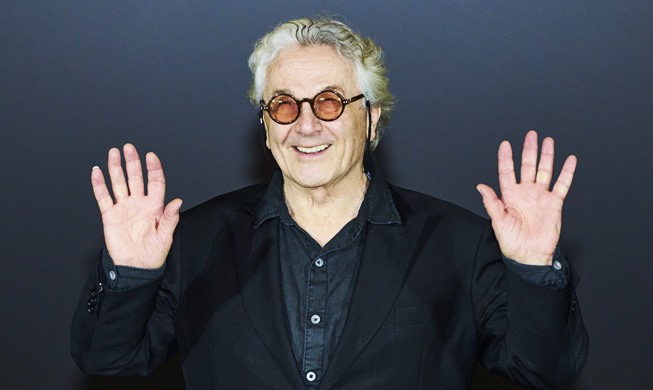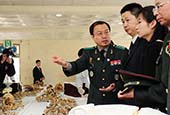-
 Korea.net's 24-hour YouTube channel
Korea.net's 24-hour YouTube channel- NEWS FOCUS
- ABOUT KOREA
- EVENTS
- RESOURCES
- GOVERNMENT
- ABOUT US
The remains of 437 Chinese soldiers who were killed during the Korean War (1950-53) over six decades ago were repatriated to China on March 28.
“Repatriation has finally come after Korea and China agreed to send home the remains of the fallen Chinese soldiers some nine months ago,” said Korean Vice Defense Minister Baek Seung-joo during a ceremony held at Incheon International Airport.
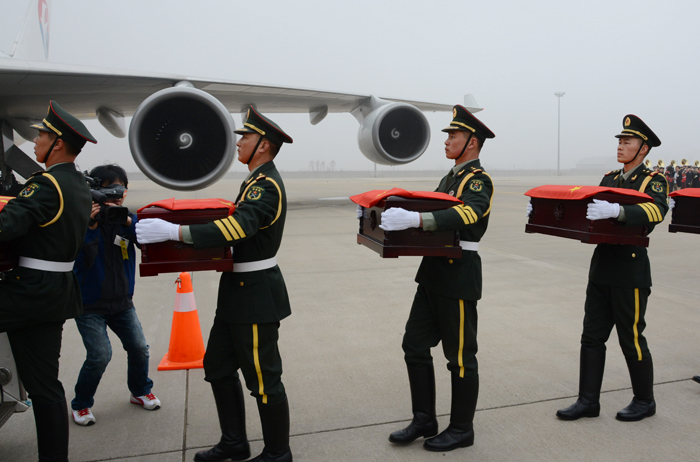
“The repatriation ceremony today is a landmark for the two countries, healing the trauma of the past and moving toward co-prosperity,” the vice minister said. He hoped that all the dreams that long-remained in the hearts of the sacrificed Chinese soldiers, dreams to make a world without wars, would come to fruition and lead to peace across the Korean Peninsula and Northeast Asia.
The hand-over ceremony was attended by about 80 representatives from Korea and China, including the Korean vice defense minister and Zou Ming, an official from the Chinese Ministry of Civil Affairs.
Zou expressed his sincere thanks to the Korean government, saying that, “We are so grateful for your proactive efforts and sincerity in making the long-awaited repatriation possible.”
“The return of our soldiers’ bodies became possible thanks to our common ground and the development of bilateral relations between Korea and China. The two countries agreed to cooperate on sending back the remains of the Chinese soldiers to their home country if more remains are found,” the Chinese official added.
The Korean Ministry of National Defense hailed the handover of the fallen soldiers’ remains as a, “new milestone helping to further upgrade the relationship,” between the two countries, and as an, “exemplary contribution to peace across Northeast Asia.”
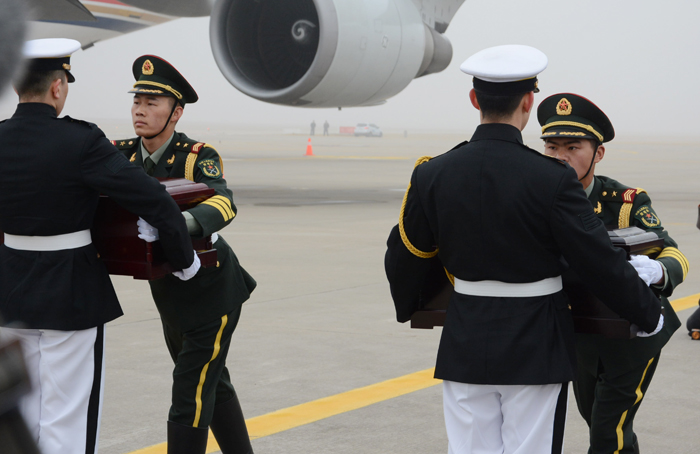
In addition, the defense ministry said that it will continue to cooperate on this issue, stating that, “The remains of Chinese soldiers will be repatriated home every year, as they are identified.”
China has been responding positively to the Korean government’s decision to repatriate the remains. The Chinese Ministry of Foreign Affairs welcomed their return, saying, “We firmly believe that this cooperation will bring together the peoples of the two countries and will make us stronger allies.”
Chinese Foreign Ministry spokesperson Hong Lei also stated that Chinese President Xi Jinping expressed, “heartfelt, sincere gratitude,” to the Korean government for handing over the remains, during summit talks with Korean President Park Geun-hye on the sidelines of the 3rd Nuclear Security Summit in The Hague, Netherlands, on March 23.
Meanwhile, the People’s Daily, a Chinese newspaper, quoted Qi De Xue (齊德學), a former vice president of the Military History Research Department at the Chinese Military Institute, as saying that, “Both Korea and China regard the repatriation effort as being very crucial and, in effect, it bears testimony to all of our humanitarianism.”
The return of the remains, he continued, is, "a good deed that warms the hearts of people and wins over their minds.”
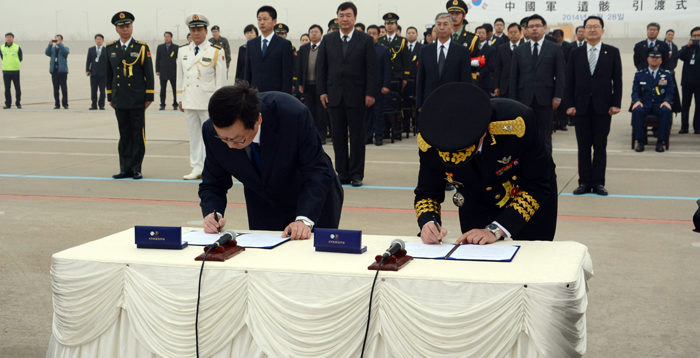
The transfer of the remains became possible when President Park Geun-hye offered to repatriate the remains of the fallen Chinese soldiers during her state visit to China in June last year, and the Chinese government accepted the offer.
By Wi Tack-whan, Sohn JiAe
Korea.net Staff Writers
whan23@korea.kr
“Repatriation has finally come after Korea and China agreed to send home the remains of the fallen Chinese soldiers some nine months ago,” said Korean Vice Defense Minister Baek Seung-joo during a ceremony held at Incheon International Airport.

Chinese soldiers transfer the coffins of Chinese soldiers who were killed during the Korean War, part of the hand-over ceremony at Incheon International Airport on March 28. (photo courtesy of the Ministry of National Defense)
“The repatriation ceremony today is a landmark for the two countries, healing the trauma of the past and moving toward co-prosperity,” the vice minister said. He hoped that all the dreams that long-remained in the hearts of the sacrificed Chinese soldiers, dreams to make a world without wars, would come to fruition and lead to peace across the Korean Peninsula and Northeast Asia.
The hand-over ceremony was attended by about 80 representatives from Korea and China, including the Korean vice defense minister and Zou Ming, an official from the Chinese Ministry of Civil Affairs.
Zou expressed his sincere thanks to the Korean government, saying that, “We are so grateful for your proactive efforts and sincerity in making the long-awaited repatriation possible.”
“The return of our soldiers’ bodies became possible thanks to our common ground and the development of bilateral relations between Korea and China. The two countries agreed to cooperate on sending back the remains of the Chinese soldiers to their home country if more remains are found,” the Chinese official added.
The Korean Ministry of National Defense hailed the handover of the fallen soldiers’ remains as a, “new milestone helping to further upgrade the relationship,” between the two countries, and as an, “exemplary contribution to peace across Northeast Asia.”

Korean soldiers hand over the remains of 437 fallen Chinese soldiers at Incheon International Airport on March 28. (photo courtesy of the Ministry of National Defense)
In addition, the defense ministry said that it will continue to cooperate on this issue, stating that, “The remains of Chinese soldiers will be repatriated home every year, as they are identified.”
China has been responding positively to the Korean government’s decision to repatriate the remains. The Chinese Ministry of Foreign Affairs welcomed their return, saying, “We firmly believe that this cooperation will bring together the peoples of the two countries and will make us stronger allies.”
Chinese Foreign Ministry spokesperson Hong Lei also stated that Chinese President Xi Jinping expressed, “heartfelt, sincere gratitude,” to the Korean government for handing over the remains, during summit talks with Korean President Park Geun-hye on the sidelines of the 3rd Nuclear Security Summit in The Hague, Netherlands, on March 23.
Meanwhile, the People’s Daily, a Chinese newspaper, quoted Qi De Xue (齊德學), a former vice president of the Military History Research Department at the Chinese Military Institute, as saying that, “Both Korea and China regard the repatriation effort as being very crucial and, in effect, it bears testimony to all of our humanitarianism.”
The return of the remains, he continued, is, "a good deed that warms the hearts of people and wins over their minds.”

Korean colonel Moon Sang-gyun (left) and Zou Ming, an official from the Chinese Ministry of Civil Affairs, sign a hand-over agreement to repatriate the remains of fallen Chinese soldiers at Incheon International Ceremony on March 28. (photo courtesy of the Ministry of National Defense)
The transfer of the remains became possible when President Park Geun-hye offered to repatriate the remains of the fallen Chinese soldiers during her state visit to China in June last year, and the Chinese government accepted the offer.
By Wi Tack-whan, Sohn JiAe
Korea.net Staff Writers
whan23@korea.kr
Related Contents
Most popular
- First hearing-impaired K-pop act hopes for 'barrier-free world'
- 'Mad Max' director impressed by 'cinema-literate' Korean viewers
- Romanian presidential couple visits national cemetery
- President Yoon, Japan PM pledge better trilateral ties with US
- President, Romania pledge better defense, nuclear power ties




